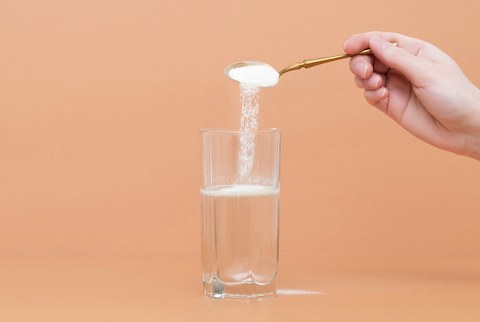Advertisement
Do Creatine Supplements Break A Fast?


Creatine has become a household staple for many over the last few years as more folks realize this "sports" supplement is a daily essential—no matter your age or activity level. This well-researched powder is known to increase muscle mass1 (alongside any amount of strength training), enhance strength and power, and promote recovery in addition to supporting brain and bone health.*
But many question whether or not creatine breaks a fast. In short, since a pure creatine monohydrate powder does not contain calories or sugar, it won't break your fasting window. However, there are exceptions depending on which creatine product you choose and the way you decide to take it. Here's what you need to know.
What breaks a fast?
So the goal of fasting is to create a sizable window of time when you aren't consuming food. That may look like a 16-hour fast followed by an eight-hour eating window, a shorter 12-hour fast, or even a longer alternate-day fast when you fast for 36 hours and eat for 12.
Restricting dietary intake for this extended period of time gives your digestive system a break and prevents triggering an insulin response. Overall, research shows2 that the effects of intermittent fasting may help improve insulin sensitivity (meaning you manage blood sugar better), lower blood pressure, reduce inflammation, and support cognition. (Although it's important to note that many of these benefits are also seen by following a balanced eating pattern like the Mediterranean diet3.)
Therefore, consuming any food or beverage that stimulates an insulin response can contain calories that can break a fast. This includes:
- Carbohydrate-containing foods (grains, fruits, vegetables, pastries, chips, candy)
- Sugary drinks (juices, sodas, milks)
- Protein (meat, fish, eggs, dairy, legumes)
- Fats (oils butter, nuts, seeds avocados, but some people choose to consume a small amount of fats like coconut or MCT oil during fasting as it's not likely to have much of an insulin response)
Foods and drinks that don't break a fast include ones that contain zero calories and include:
- Water
- Black coffee
- Tea (with no sugar or milk)
- Electrolytes (if they are zero-calorie)
- Creatine monohydrate (if there are no calorie additives)
How does creatine work?
Creatine works by helping muscle and brain tissue efficiently produce energy in the form of ATP (about 95% of the body's creatine4 is stored in muscle tissue, and the remaining 5% is dispersed in the brain and bones). When the muscles need energy quickly—like during a workout—the body then taps into its muscle creatine stores for support.*
And although creatine helps cells generate more energy, it's naturally zero calories. That's because creatine is a compound made from three amino acids: methionine, glycine, and arginine. But creatine itself is not an amino acid or something that gets broken down into glucose.
Does creatine break a fast?
Creatine monohydrate alone does not break a fast. Creatine has no calories, does not spike insulin or blood sugar, and does not trigger digestion (it's absorbed passively in the intestines).
When you take it with water, black coffee, or tea, your fasting schedule remains intact. Some flavored creatine powders may contain stevia, but creatine can break a fast when consumed as part of:
- A smoothie, protein shake, yogurt bowl, or oats
- A pre-workout that contains sugar or protein
- Sugar-containing creatine gummies
What's the best way to take creatine?
Creatine is best taken in its powder form (not gummies, and here's why). And you want creatine to be in the form of creatine monohydrate. Not only is this a pure form of the compound (meaning no extra excipients have to be added), but it's also the most researched form of the supplement, and the body is able to absorb 100%5 of it.
Creatine supplements combined with other amino acids (like mindbodygreen's creatine with taurine+ with taurine) offer even more muscle and brain benefits while still remaining zero sugar and fasting-friendly. Customers have been loving creatine with taurine+ to help tone their muscles and enhance their strength.*
How much creatine should you take?
Research suggests taking 5 to 10 grams of creatine daily. A 5-gram dose6 is linked to improvements in muscle mass, but a larger 10-gram dose7 may be more beneficial for cognition, bone health, and even strength.*
FAQs
Does creatine spike insulin?
No, creatine does not stimulate an insulin response. It's a noncaloric compound that does not affect blood sugar or digestion.
Does creatine with stevia break a fast?
Some flavored creatine monohydrate powders may include stevia. Stevia is a zero-calorie sweetener that does not lead to an insulin response. Therefore, consuming creatine products with stevia (and without added sugars) still won't break your fast.
The takeaway
Creatine monohydrate powders can be consumed during your fasting window (as long as you don't take them with a calorie-containing beverage or meal). The most important thing to remember with creatine supplements is to take that effective dose (5 to 10 grams) every day. Not sure where you start? We rounded up our five favorite creatine powders here.
7 Sources
- https://pubmed.ncbi.nlm.nih.gov/34234088/
- https://pubmed.ncbi.nlm.nih.gov/38500840/
- https://pubmed.ncbi.nlm.nih.gov/37885010/#:~:text=Adherence%20to%20MedDiet%20was%20found,and%20renal%20health%20(1.2%25).
- https://www.ncbi.nlm.nih.gov/pmc/articles/PMC2048496/#:~:text=Approximately%2095%25%20of%20the%20body's,testes%20%5B8%2C15%5D.
- https://www.ncbi.nlm.nih.gov/pmc/articles/PMC8912867/
- https://www.ncbi.nlm.nih.gov/pmc/articles/PMC3407788/
- https://www.ncbi.nlm.nih.gov/pmc/articles/PMC10526554/
